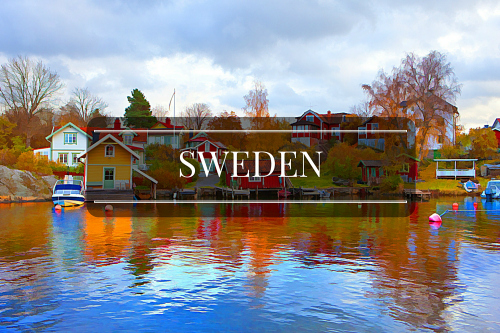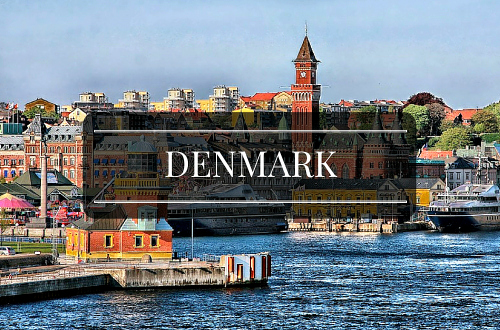One of the key factors that expats look at when relocating to a different country is whether the destination has a healthy environment and affordable, accessible, and reliable healthcare. In a recent survey, expats were asked to rank their health and wellbeing in the countries they lived in.The survey, conducted by InterNations, involved 14,300 expats living abroad in 191 countries, representing 174 nationalities. They rated 43 different aspects of life overseas on a scale of 1 to 7. One of these sub-indexes was health and wellbeing. Expats rated the following 13 countries as among the healthiest destinations in the world.
Sweden is frequently found on lists for quality of life rankings. It is also widely known as a destination with affordable and efficient healthcare. Expats also regularly rate the local surroundings in Sweden as healthy places to live in.

According to a recent poll, Sweden is also named as the best country for expat families to raise children. Sweden’s high ranking can be attributed to a healthy lifestyle. Sixty-nine percent of the 26,871 expats, from 45 different countries, maintained that the health and wellbeing of their children saw an improvement since moving to Sweden. Childcare emerged as a prominent factor, and 75 percent of expats rated the quality of childcare in Sweden as better than what was available in their home countries.
The healthcare system in Sweden often serves as a model for other countries. Sweden spends less that some other countries, but still delivers excellent services.

One of the reasons for Canada’s high ranking were the short working weeks and access to quality healthcare. Canada provides universal healthcare to all its citizen and permanent residents. The public health insurance system is called Medicare, and allows people to avail themselves of treatment at public and private healthcare facilities.
Healthcare in Canada adheres to an excellent standard, and this is evident in low infant mortality rates and high life expectancy. However, it must be kept in mind that the healthcare benefits do not apply to expats with temporary residence in Canada.
Each Canadian province or territory stipulates what is covered by their specific healthcare plan, and what is excluded. Usually, optometry, dentistry, ambulance services and outpatient prescription drugs are not covered, while all essential health services such as acute hospital care and most physician services are covered.
The main drawbacks of the system are the long waiting times and scarcity of general practitioners. However, in spite of this, most Canadian citizens and expats maintain that they are happy with the system.

New Zealand’s cost of living is on the higher side, but health and wellbeing are rated highly by expats. Most individuals living in New Zealand report that they live fairly healthy lifestyles and have access to fresh food, the outdoors and a good public healthcare system.
The healthcare system receives its funds via general taxation, so residents are able to access free or subsidized medical care. Public healthcare in New Zealand is known to meet high standards. Private healthcare is also available. To gain access to free public healthcare, expats must have a work permit or permanent residence permit.
Expat families who relocate to New Zealand say they did so because they wanted a fresh start and an improved work and life balance. New expats are especially drawn to the state-sponsored healthcare system, low crime rates and a society that emphasizes the value of children, and the environment.

Spain enters the top ten for health and wellbeing for various factors such as having one of the shortest working weeks in the world and a culture that is known for its healthy diet and attitude towards food.
Spain is also a premier destination for health and medical tourism, and spa and wellness holidays. Visitors travelling to Spain for health or medical tourism find that healthcare is quicker and more affordable than in their home countries.
Many visitors also travel to visit many of Spain’s spa and wellness facilities to improve their personal wellbeing through preventative therapies that boost overall health and improve the quality of life.
Spain’s healthcare system is often rated as among the best in the globe. It guarantees universal coverage and no upfront expenditure, apart from paying a part of prescription charges. The country spends almost 10 percent of its GDP on healthcare and has a favorable doctor-patient ratio, with four doctors per 1000 people.

The local environment and range of activities available make Costa Rica a destination that expats maintain is excellent for their health and wellbeing.
According to World Bank, World Health Organization and United Nations statistics, Costa Rica is the healthiest country in the Americas. Globally, the country ranks 24th and makes it to number one on the Latin America list. One of the reasons for this is the excellent healthcare available in the country.
Expats can access both the public and private healthcare system. Both systems are routinely upgraded with modern equipment, new hospitals and staff training.
Expats looking for a healthier lifestyle have made Costa Rica their home due to the incredible natural scenery, fertile land and native super foods. Costa Rica is native to some of the healthiest food in the world such as coconut, which is full of vitamins and minerals; noni, which is known for its immune boosting properties; and the antioxidant-rich cacao.

One of the main reasons for France’s high ranking on the criteria for health and wellness is its easy access and affordability of the healthcare system. Despite the calorie-rich diet, the French have a long life expectancy, which is 85 years for women and 78.5 for men.
Healthcare, which meets high standards, is affordable. The French government implemented a new healthcare system for foreigners in 2016, called the Protection Universelle Maladie (PUMA), the goal of which is to simplify the existing healthcare system and reduce paperwork, while guaranteeing access to healthcare for all who work or live permanently in France (more than three months). By the end of 2017, doctors and certain medical professionals will also have to waive upfront payments, as they will be paid directly by the government or health insurer.
Some of the other reasons that make France such a healthy destination for expats are the availability of fresh, seasonal food; the importance of home-cooked meals; consumption of smaller portions; and the habit of walking everywhere.

Germany is known for its job security, access to quality healthcare, and good quality of life. The German culture is one of discipline and high work ethic. This structured, disciplined environment is a key component of a healthy lifestyle. Germany has an excellent standard of healthcare and its culture is focused on healthy living.
Expats in Germany will find that both the public and private health facilities meet their expectations. Berlin, in particular, is an important health destination in Europe and is home to some of the nation’s largest medical centers. The country also houses many leaders in medical research and pharmaceuticals. There are more than 2,000 hospitals in the country and therefore medical assistance can be sought quickly. In addition to public hospitals, there are also two types of private hospitals: non-profit and for-profit. The medical facilities in public and private facilities meet high standards and waiting times are short.

Denmark is renowned for its healthy work-life balance. The country’s welfare model is based on flexible working hours, social support networks, and maternity leave and childcare facilities; which contribute to a high standard of living.
The Danes prioritize between work (career, ambition) on one hand, and life (health, wellbeing, family) on the other. The increased flexibility at work means that they can often choose their working day and can even work from home in certain situations. The lunch break at work places takes place at a fixed time daily and is a chance for colleagues to get away from their desks, and interact while eating together. Danes also receive a minimum of five weeks’ paid holiday.
It must be noted that Denmark has slid down various rankings primarily due to its increasing cost of living, which impacts daily life. But in spite of this, the emphasis on health and wellbeing is still strong.

A recent study in which international researchers surveyed statistics for 188 countries on global life expectancy found that Israelis are among the healthiest people in the world and enjoy a long life expectancy.
Israelis are known to have one of the healthiest diets in the world due to the country’s strategic location on the Mediterranean crescent, a region known for its diet rich in vegetables, fish and unsaturated fat.
Israel has a universal healthcare system that is run by semi-private and non-profit organizations, and is also heavily regulated by the government. All citizens have access to the same Uniform Benefit Package. Israel’s healthcare is on par with that of many developed countries, including the USA and most of Western Europe.
While health and wellbeing in Israel is among the best across the globe, the country gets a low ranking in the index for personal safety and security.

Eighty-two percent of expats rated Japan’s quality of medical care favorably, while 76 percent maintained that they were also pleased with the affordability of healthcare.
Japan has the highest ‘healthy life expectancy’ in the world, with individuals expected to live to the age of 73 without any disability or major illness. One factor that seems to be responsible for the long life expectancy is the Japanese diet.
In comparison to other developed countries, Japanese people consume fewer calories daily and follow a healthier pattern with more fish and vegetables, fewer dairy products and less meat. They also eat smaller desserts and the portion sizes are more reasonable. According to the World Health Organization, more than 98 percent of Japanese children walk or bike to school, and hence have physical activity incorporated into their lifestyles from an early age.

Expats rated Finland highly on the affordability of healthcare, with 75 percent giving positive ratings also for the quality of healthcare.
The Finnish healthcare system gets 80 percent of its funding from general taxation that is accrued at the local and national level. All citizens are entitled to state healthcare regardless of financial situation. Nationals of the EU/EEA countries on a temporary stay in Finland qualify for state-provided healthcare on provision of a European Health Insurance Card (EHIC). There is also private healthcare available for those who prefer it.
Finland ranks fifth in the World Happiness Report 2016. Employees in Finland spend less time at work (6.5 hours per day) than the average global employee. In a ranking of 71 global cities where individuals have the best work-life balance and leisure time, Finland’s capital city of Helsinki was fourth on the list.

Taiwan’s healthcare system is user-friendly and affordable. Expats can avail themselves of medical care provided by highly skilled professionals in hospitals and clinics that equipped with modern technology. Citizens of Taiwan and most expats avail of state-funded healthcare through the National Health Insurance (NHI). Both public and private facilities provide a high standard of care. Private hospitals offer more options and have less waiting times. Taiwan has also set up special clinics that cater to the English-speaking community. Doctors at these clinics have a better cultural understanding of Western medicine and expats receive bills that are translated into English.

Austria scores well in a number of measures of wellbeing compared to other countries in the OECD Better Life Index.
The country received above average rankings in the criteria of jobs and earnings, subjective wellbeing, personal security, social support, quality of the environment, and education and skills.
Expats in Austria will have access to one of the best healthcare systems in Europe. They are entitled to public healthcare due to contributions made through their taxes. On account of this, and also because of the excellent standard of public healthcare, most expats do not seek private health insurance.
What is the healthcare system like where you live? Share your thoughts in the comments.

